Pocket-sized keychain defense weapons, though popular for personal safety, face varying legalities globally. Local regulations govern their classification as self-defense tools or restricted weaponry, necessitating permit requirements and size/capacity limits. Compliance is vital to avoid legal issues and ensure these devices balance personal security with public safety standards. Researching local laws before acquiring such a weapon is crucial.
“Ensuring safety while empowering personal defense is the focus of this comprehensive guide to keychain safety devices. With pocket-sized keychain defense weapons gaining popularity, understanding their legal implications is paramount. This article navigates the intricate web of regulations surrounding these compact self-defense tools. From local laws and restrictions to compliance standards, we explore what you need to know before carrying a keychain defense device. Discover your rights and responsibilities in this essential read for those seeking effective personal protection.”
- Understanding Keychain Defense Weapons: A Legal Perspective
- Pocket-Sized Devices: Are They Legal in Your Region?
- Local Regulations and Restrictions: What You Need to Know
- Compliance and Safety Standards for Keychain Weapons
- Rights vs. Responsibilities: Carrying a Keychain Defense Device
Understanding Keychain Defense Weapons: A Legal Perspective
Pocket-sized keychain defense weapons, designed for personal safety, have gained popularity as a convenient self-defense option. From pepper spray to stun guns, these devices offer a quick and accessible way to deter potential threats. However, understanding their legal implications is crucial for responsible ownership. Each jurisdiction has its own set of regulations regarding the carrying and use of such weapons, with many countries having strict rules about size, capacity, and permit requirements.
In terms of legality, these pocket-sized devices fall under specific categories, often classified as self-defense tools or restricted weaponry. Local laws determine whether they are considered legal for civilian possession, and if so, under what circumstances. Some regions may require permits or licensing, while others might have restrictions on the type of device and its functionality. It’s essential to research and comply with local regulations to avoid legal repercussions, ensuring that the right to self-defense is balanced with public safety considerations.
Pocket-Sized Devices: Are They Legal in Your Region?
In many regions, pocket-sized keychain defense weapons, designed for personal safety and often marketed as small self-defense tools, are subject to specific legal requirements. These laws vary widely depending on your location, with some areas permitting such devices while others strictly regulate or prohibit them. Before investing in a pocket-sized keychain defense weapon, it’s crucial to check the local legislation. This includes understanding restrictions on carrying concealed weapons and any specific regulations for self-defense tools, especially those that can be easily hidden or carried in pockets.
Researching these legal aspects is essential to ensure compliance with your region’s rules. Different countries and states have different classifications for such devices, leading to varying permits or bans. Staying informed allows responsible individuals to leverage pocket-sized keychain defense weapons when needed while respecting local laws, thereby enhancing personal safety without legal repercussions.
Local Regulations and Restrictions: What You Need to Know
When considering the legal aspects of a pocket-sized keychain defense weapon, understanding local regulations is paramount. Different regions have distinct rules regarding self-defense devices, and what may be permitted in one area could be prohibited in another. These restrictions often stem from state or provincial laws, which can further vary based on city or municipal ordinances. As such, it’s crucial to research and understand the specific legal framework where you reside before purchasing a keychain defense weapon.
Many jurisdictions have specific guidelines on the types of self-defense devices allowed, their carrying capacity, and the circumstances under which they can be used. For instance, some areas might permit only non-lethal force options, while others may have more relaxed rules. Being aware of these regulations is essential to ensure compliance and avoid any potential legal repercussions.
Compliance and Safety Standards for Keychain Weapons
When it comes to pocket-sized keychain defense weapons, compliance with safety standards is paramount. These tiny tools, designed for personal protection, must adhere to stringent regulations to ensure they are safe for everyday carry. One of the primary considerations is the weapon’s trigger mechanism. It should be reliable and easily distinguishable from everyday objects, preventing accidental activation. The design should incorporate features that prevent misfires and ensure the weapon remains in a safe, locked state until intentionally deployed.
Moreover, materials used in construction must meet certain safety criteria. Non-toxic and durable materials are essential to prevent any harm to users or bystanders. Proper labeling and user manuals are also critical components, providing clear instructions on safe handling and storage. These standards ensure that individuals carrying pocket-sized keychain defense weapons can do so responsibly, knowing they meet legal requirements and contribute to overall safety.
Rights vs. Responsibilities: Carrying a Keychain Defense Device
When carrying a pocket-sized keychain defense weapon, individuals must understand the delicate balance between rights and responsibilities. While these small devices offer a sense of security, users have a duty to ensure their legal usage. Every jurisdiction has specific laws governing self-defense tools, and it’s crucial to know where your rights end and potential consequences begin.
Carrying a keychain defense device may be a personal choice for protection, but it also carries the responsibility to use it appropriately. Misuse or illegal carrying can lead to severe penalties, including fines and legal repercussions. Staying informed about local regulations is essential to protect yourself and avoid unnecessary issues.
When considering the legality and safety of a pocket-sized keychain defense weapon, it’s crucial to navigate local regulations and understand your rights and responsibilities. These devices can offer personal protection, but compliance with safety standards and legal requirements is essential. By staying informed about your region’s rules and prioritizing responsible ownership, you can ensure that carrying a keychain defense device enhances security without compromising the law. Remember, knowledge is key when it comes to protecting yourself and adhering to the guidelines set forth for these innovative personal safety tools.
